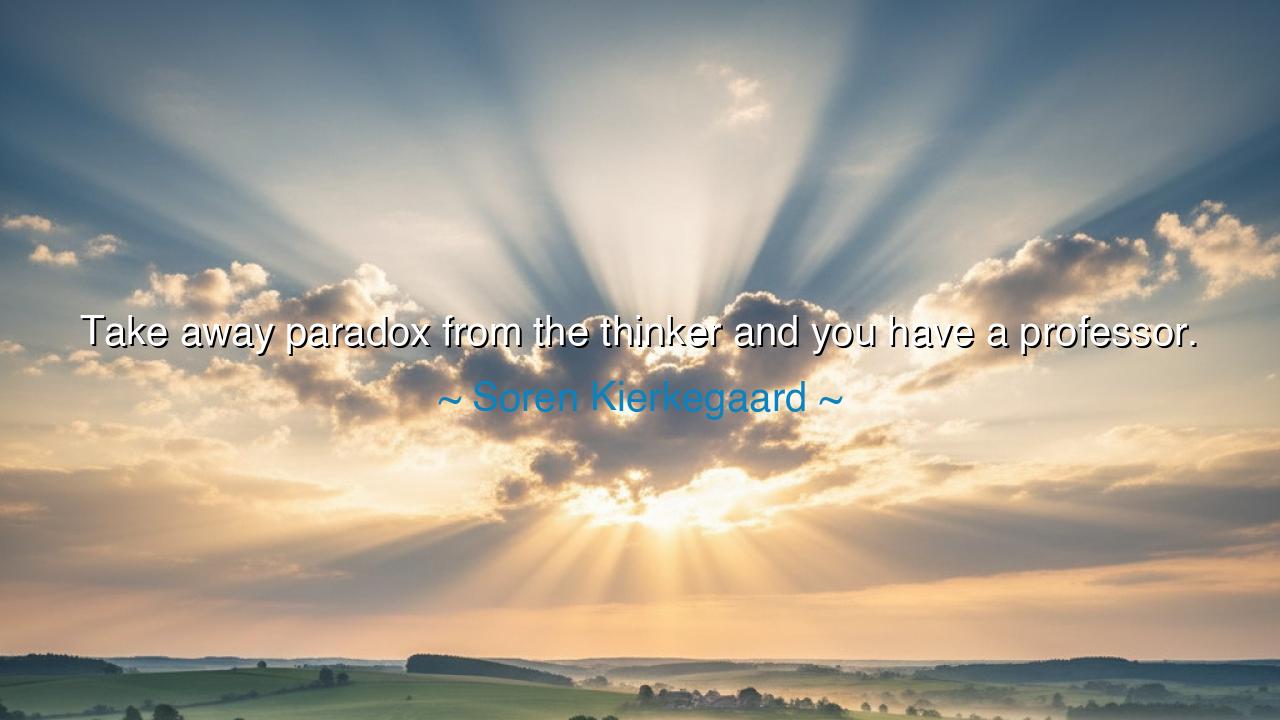
Take away paradox from the thinker and you have a professor.






Hear the fierce and piercing words of Søren Kierkegaard: “Take away paradox from the thinker and you have a professor.” These words, clothed in sharp irony, strike at the very heart of what it means to wrestle with truth. For Kierkegaard, the paradox is not a flaw but the very soul of deep thought. To the thinker, truth is never simple, never neat, never fully domesticated; it is tension, struggle, contradiction, and mystery. But remove this fire, strip away the trembling before the impossible, and all that remains is the professor—a transmitter of formulas, a cataloguer of facts, one who explains but does not burn.
The ancients knew the weight of paradox. Heraclitus declared that the road up and the road down are one and the same. The Oracle of Delphi spoke in riddles, forcing seekers to wrestle with ambiguity. The Hebrew prophets thundered visions where mercy and justice, wrath and love, stood side by side. And in the East, the sages of the Tao offered koans—mysteries that the rational mind could not solve but only contemplate until the heart broke open. To think is to live in paradox; to flee paradox is to cling only to the surface of things.
Kierkegaard himself was haunted by the greatest paradox: that the eternal entered time, that the infinite clothed itself in the finite, that God Himself became man in the figure of Christ. For him, this was not a doctrine to be filed away in tidy categories; it was a living mystery that demanded awe, anguish, and faith. The professor could explain it, footnote it, classify it, but the thinker must tremble before it, for in the paradox lies the very pulse of existence.
History gives us many examples. Consider Socrates, who never claimed certainty, but forced Athens to confront contradictions within their own beliefs. He was no mere lecturer; he lived and died in paradox, condemned for corrupting the youth even as he awakened them to truth. By contrast, think of those in every age who sit safely in halls of learning, explaining life without ever living it, analyzing love without ever being wounded by it, teaching faith without ever trembling before the divine. These are the professors Kierkegaard warned against—not false men, but incomplete ones, who mistake clarity for wisdom.
The wisdom here is that true thinking is not comfortable. It is not the recitation of formulas, but the embrace of contradictions that cannot be dissolved. To be a thinker is to walk the knife-edge between opposites, to live in tension without despair, to allow mystery to shape you rather than demand it fit your categories. The professor seeks mastery; the thinker seeks truth. And truth, Kierkegaard reminds us, is always larger than the mind that pursues it.
The lesson for us is this: do not be afraid of paradox. When life confronts you with contradictions—love and loss, joy and sorrow, faith and doubt—do not seek to erase one side to make the other bearable. Instead, hold them both, and let the paradox deepen you. In that struggle, you will grow beyond formulas, beyond easy answers, into wisdom that breathes. Better to tremble as a thinker than to rest secure as a professor who has silenced the questions.
Practical action flows from this truth. Seek out paradoxes in your own life, and meditate on them rather than fleeing from them. Read not only to gather information, but to be unsettled, to be broken open by truths too great for logic alone. In conversation, resist the urge to resolve all tensions; sometimes the greater wisdom lies in dwelling with them. And above all, live the paradoxes—love though it breaks you, believe though you doubt, hope though the world mocks hope.
So let Kierkegaard’s words echo through the ages: “Take away paradox from the thinker and you have a professor.” Choose, then, not the safety of the lecture hall alone, but the fire of the paradox. For it is there, in the struggle between opposites, that the soul is forged, the mind is awakened, and the spirit discovers truth too vast to be contained.






AAdministratorAdministrator
Welcome, honored guests. Please leave a comment, we will respond soon